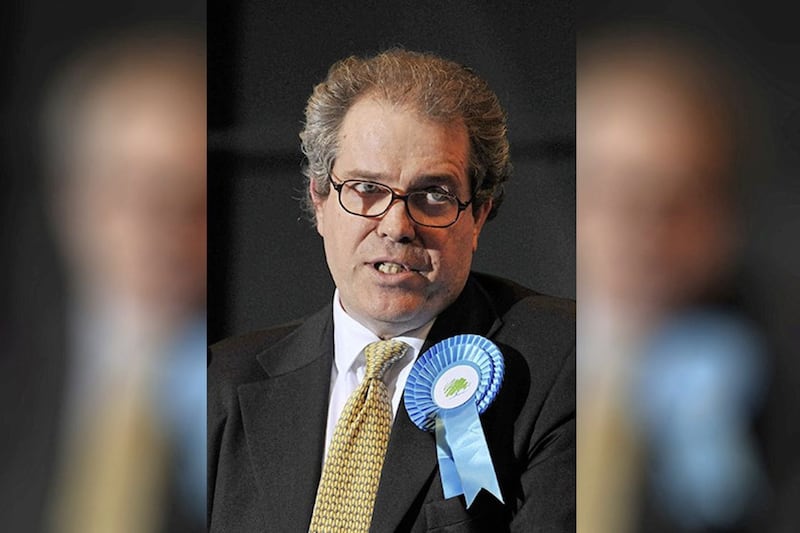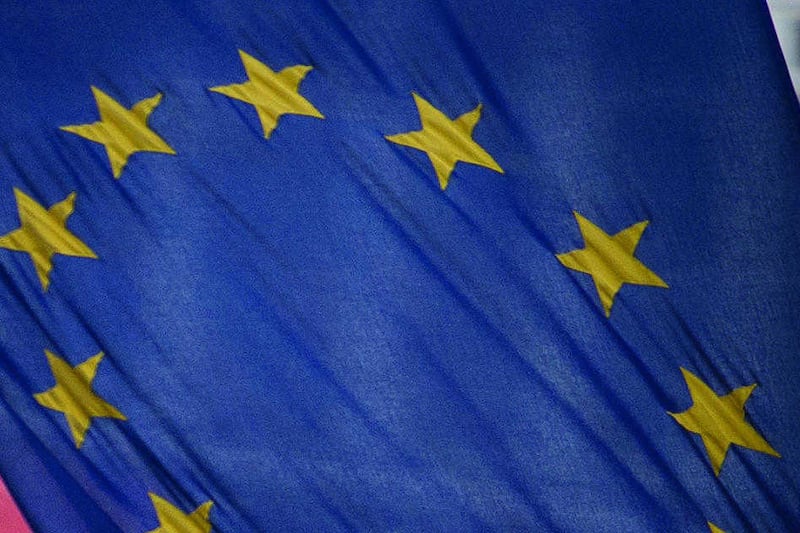EDDIE Izzard never does anything by halves. He has performed comedy in numerous languages in massive stadiums, run not just one marathon but 27 in 27 days and campaigned in 31 cities over 31 days for the remain side in the Brexit referendum.
The cross-dressing comedian, actor and writer – a former resident of Bangor, Co Down, who originally wanted to join the SAS – constantly sets himself seemingly impossible challenges and frequently diverts from any conventional career path to a more mountainous, hazardous route which is much trickier to navigate.
His latest diversion, memoir Believe Me, reveals – in part – why he's developed such a tough, resilient skin.
Today, dressed in 'girl mode' jacket, tight jeans and black patent stilettos, fuschia pink lipstick, scarlet nail varnish, long false eyelashes and diamond stud earrings, his thoughts seem as random and surreal as some of his comedy, relaying themes as they pop into his head and frequently going off on tangents.
"Some people say to me, 'Oh, you just do challenges. But there are challenges and challenges. How many can you get in a taxi? I'm not doing those. I'm doing things that have a positive effect on the country, but I want to reach out to other countries – can we learn from you, can you learn from us? We can all do more than we think we can."
But, 27 marathons in 27 days? What was that all about?
"Why not?" Izzard, who was born in what was then the British colony of Aden, says simply. "It's adventurous, endurance and fortitude. It's fighting for something, and people saying, 'that can't happen'. It's and me saying 'I can make it happen', raising money and inspiring people.
"We've got one life. Let's live it positively, rather than Donald Trump, who's living it negatively."
Fifty-five-year-old Izzard is a tough character but you can understand why when you look at his past. The son of BP's chief accountant Harold Izzard, his mother Dorothy Ella died from bowel cancer when he was six, a year after the family returned to Britain from the north, but his parents didn't tell him she was dying and he wasn't prepared for the emotional loss.
Soon after, he and his older brother Mark were sent to boarding school, another traumatic event which led to him battening the hatches emotionally, as detailed in a chapter he entitles 'Exile'.
"We didn't see Dad for two thirds of the year. I did a lot of crying and wailing. I was unhappy about everything and feeling sorry for myself. I cried till I was 11," he recalls.
"Boarding school toughens you up. It can make you emotionally dead because you are emotionally blocked, but you are tough. You can't empathise or sympathise."
He didn't cry again until he was 19, when a cat was run over in the road in front of him. He picked it up and, realising that he needed to feel something, forced himself to cry.
"I ripped open those pathways to ensure I knew how to cry. I knew it was bad not feeling anything."
On leaving school, he started an accounting and financial management degree at Sheffield University, where he took his first steps into comedy. Inspired by Monty Python, he set out to take a show to the Edinburgh Festival – and through sheer grit, determination and persistence, staged his first show there in 1981.
He'd been wanting to wear dresses since he was four or five, and as a teenager used to put on his stepmother's dresses and use her make-up when she was out, but remained a closet transgender, although he says he never felt repressed at university.
"If you're a straight transvestite and you fancy girls, it's not a big deal. You can have relationships – just don't mention you're transgender."
After Edinburgh, he thought that his end goal, to be on television, would follow. It didn't – and he found himself in what he calls 'the wilderness years', dropping out of university, doing street comedy in London for almost a decade – and 'coming out' in 1984.
"It sort of made me in the end. It's such a hard thing to do. Now I'm as calm in boy mode as I am in girl mode. For a long time, if I was in girl mode I was more tense, more nervous."
He remembers the first time he stepped out in a dress and high heels.
"I just felt fear, fear, fear..." he trails off. "But I also felt, 'This is how I want to express myself, so I've got to do this'. It's a visible thing. If you're gay, you don't have to go round saying 'I'm gay', but if you're transgender and you're noticeable, you've got to be able to fight.
"But in the end, you are given this tremendous confidence, in the sense of, 'Who else has done the journey to get to here?' I've dealt with people shouting abuse at me, fighting me in the streets, whatever," he continues. "Last year there was some guy screaming at me outside my house so I reported him to the police."
The man in question was found guilty on two counts of using threatening and abusive words or behaviour with intent to cause harassment, alarm or distress, and given a suspended prison sentence.
Izzard's happy to talk about his ambitions, his sexuality and his politics – he's a member of the Labour party and keen remain supporter – but is not so forthcoming about his relationships. He mentions several ex-girlfriends in the book but bristles a little at the suggestion that he gives little away emotionally when describing his feelings towards them.
"I'm not going to go into that," he says carefully, although he admits that he hasn't got his personal life sorted out.
"If you get a career going well, a relationship can be here, there and everywhere. Timing is really tricky. You've got to find someone you're compatible with. I have put my career first because easy relationships weren't there."
Does he want to settle down and have a family?
"What does settle down mean? Stop? I don't want to stop. I do have a relationship now but I'm not telling you about it because it's their wish. I've said many times I want to have kids."
Izzard is constantly setting the bar higher for himself. Even during the decade of bleak emptiness during the wilderness years, or when he had blister upon blister during his gruelling marathons, he never considered quitting.
He's soon to be seen as Bertie, the Prince of Wales, alongside Dame Judi Dench in the forthcoming movie Victoria & Abdul, out in September, has two more movies planned for this year and is looking forward to his next stand-up show, to be performed in Central and South America – in Spanish.
And in the first general election after 2020 he'll be running for MP, he says confidently, in whichever constituency will have him. If that happened, he'd put his showbiz career on hold.
"This is just the beginning of another chapter," he concludes.
:: Believe Me by Eddie Izzard is published by Michael Joseph, priced £20.







